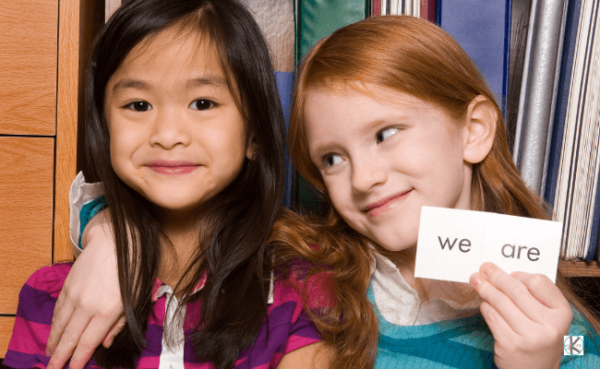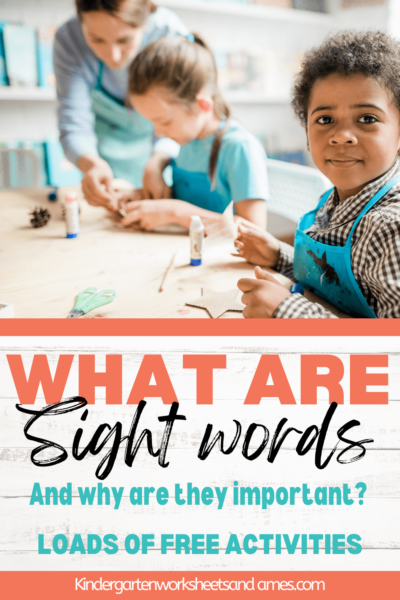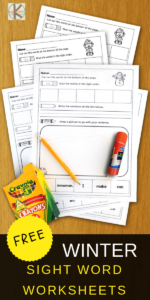Love them or hate them, every child starting school will have to deal with Kindergarten sight words. But what are they? Why are sight words so important? In this blog post, we will answer those questions and more! We will delve into the history of sight words, learn what they are, and discover why they are essential. As an added bonus, we’ve included a comprehensive list of sight word activities you can use in your classroom or home.
Kindergarten Sight Words
One of the most rewarding and challenging aspects of teaching is watching new students start their journey towards literacy. Let’s face it, learning to read can be a tricky business. Young readers must master various strategies to make sense of the printed text. Sight words are an essential part of this process and are usually included in any successful reading program. Helping students master these words can help lay the foundation for success in reading. There are many resources available to help teachers and parents teach sight words to Kindergarteners. With a little bit of practice, most young learners quickly take off. However, before we talk about HOW to teach sight words and point you to all our free resources – let’s answer the two pressing questions. What are sight words? Why is it important to teach them?
What Are Sight Words?
Sight words are the most frequently used words in our language. They are words that we see often. Some people call them “high-frequency words” because they repeatedly appear in any given text, from newspapers to novels. Children that can recognize and read these words without sounding them out are well on their way to becoming fluent readers.
So who figured this out, and why are they important?
What are Sight Words for Kindergarten
A Short History Of Sight Words
You may wonder where the idea of sight words came from. Who discovered them? How long have teachers been focusing on them? There were two pioneers in the field, and we are still using their lists of sight words today.
Edward Dolche
In the 1930s, a researcher named Dr. Edward Dolche was one of the first to study the words used in literature. He found that certain words appeared over and over again in children’s books. He also noticed that when children could read these words quickly and effortlessly, their reading fluency improved. From these observations, he concluded that if children could learn to recognize these words by sight, they would be able to read with greater fluency. And so the teaching of sight words was born!
Dolce compiled a list of 220 words in 1936 and published them in his book “Problems in Reading. It is estimated that 75% of all words used in children’s books are on this list. They include a mixture of adjectives, verbs, pronouns, adverbs, conjunctions, and prepositions.
Dolce also created another list of 95 nouns. These lists are listed in separate groups that are sorted by grade level from Pre-K to third grade. If you are interested, you can find the lists here.
Edward Fry
Sixty years later, another researcher, Dr. Edward Fry, published a book titled “Fry 1000 Instant Words.” Fry reported that
- A surprisingly small number of words (only 25) account for roughly 33% of the words used in published material.
- Secondly, 100 words make up approximately 50% of all words used in printed material.
- Finally, 1000 words make up about 90% of everything we read.
If you are interested, you can find the first 100 Fry’s words here.
High Frequency Words Kindergarten
Why Are We Teaching Sight Words?
When it comes to teaching children to read, sight words are a vital part of any literacy strategy. Here are 4 benefits
- Learning even the first 25 Kindergarten sight words for young children starting to read will make a huge difference. Being able to recognize most of the words on a page gives children a real sense of accomplishment and encourages them to keep reading. Sure, you can painstakingly sound out every word on the page, but that is slow and cumbersome. Every time you sit down with a book, you have to labor over every word. Imagine how discouraging it would be to constantly struggle with reading. Would that motivate you to keep trying?
- Some sight words don’t follow phonics rules, so kids can’t sound them out. Instead, they need to learn to recognize them by sight. Examples of this include such words as like, are, have, and was. If young readers learn to recognize such words by sight, they won’t experience the frustration of trying to sound them out.
- Being able to read sight words encourages many children to learn new words. When your child looks at a passage, they will already know at least half of the words. This means they can focus on learning the remainder without becoming overwhelmed.
- Sight words can be a big help to children when they are trying to read. If a child knows the sight words, she can use them as clues to figure out what the text says. And if there is a picture with the text, the child can get even more hints.
As you can see, there are many reasons why Kindergarten sight words are so important! Learning them gives children a real boost when it comes to reading. Sight words provide a strong foundation for reading. Pair them with phonic skills, and watch children soar.
The Best Way To Learn Kindergarten Sight Words
In kindergarten, one of our primary objectives is to help kids identify sight words quickly. We want them to be able to read these words without having to sound them out. At this age, memorizing sight words becomes a drag very quickly and is ineffective. So, what can we do to spice things up? Here are a few tips.
Practice Makes Perfect
While there are many different ways for children to learn sight words, the most important thing is getting plenty of practice. Make sure that you do some sight word practice every day without fail. When it comes to sight words, there is no one-size-fits-all approach. Every child is different and will respond to other methods of teaching. The important thing is to be patient and flexible and to keep trying new things until you find an approach that works for each child.
Games Are Your Secret Weapon
Children love games, and sight word games are a great way to sneak in some extra practice. Students won’t even realize they’re learning while they’re having fun! We’ve listed loads of sight word games below, so you’re sure to find one that your students will love.
Use Sight Words In Writing Activities
One of the best ways to help children learn sight words is to provide opportunities to use them in context. Reading activities and games are great ways to do this, but writing can be equally beneficial. When children use sight words in their own writing, it helps them to better internalize the words and makes it easier to recognize them when reading. In addition, writing builds muscle memory and helps fix the word in the children’s brains.
Kindergarten Sight Words kg
Now that you have learned all about Kindergarten sight words, it is time to put that knowledge into practice! Below you will find a list of resources and activities to help your Students learn those all-important Kindergarten sight words.
Kindergarten Sight Words Activities
Looking for more fun, engaging and free kindergarten sight word activities, games, and worksheets? Check these resources out:
- Dinosaur Sight Words Activity
- Summer Mazes – Sight Word Worksheets
- Apple Sight Words Tree Activity
- Easter Sight Words Maze Worksheets
- Star Wars Sight Words Activity
Kindergarten sight words games
- Pirate Sight Words Games
- Crazy Roads – Kindergarten Sight Word games
- Sight Words BINGO
- Feed the Dog Sight Words Game
- Sight Word Candyland Game
- Battleship Sight Words Game
Sight word games for kindergarten
- Farm Printable Sight Word Games
- Guess Who Sight Word Games
- Pumpkin Sight Words Game
- Blackout Sight Word Game
- Arctic Animals Sight Words Game
- Train Sightwordsgame
- Printable Sight words BINGO
- Rocketship Kindergarten Sight Words Game
Kindergarten sight words worksheets pdf
- Free Christmas Sight Word Worksheets
- Read! Trace! Write! – building sentences with sight words
- Rapunzel Sight Word Coloring Pages
- Sight Word Groundhog Day worksheets
- Color by Sight Word Christmas
- Thanksgiving sight word coloring pages
- Popcorn sight words printables
- Gingerbread Sight Word Coloring Sheets
- Ocean Sight Words Worksheet
- Winter Free Sight Word Worksheets
- Tracing Sight Words Worksheets
Kindergarten sight words printable
- Printable Sight Words List
- Free printable sight word books
- Color by Sight Word Spring Reader
- Kindergarten Sight Words Printable Book
- Super Hero Sight Word Readers
- Bugs! Sight Words Printable Reader
- Spring! Sight Word Printable Reader
- Kindergarten Reading the EASY Way – ways to master kindergarten sight words
Kindergarten sight words activity
- Flower Sight Word Maze Worksheets
- Bug Sight Word Games
- Peacock Kindergarten Sight Words Activity
- Kindergarten Sight Words Christmas Activity
- Candy Cane Sight Words Activity
- Garden Sight Words Activity
- plus lots more kindergarten sight words activities






























